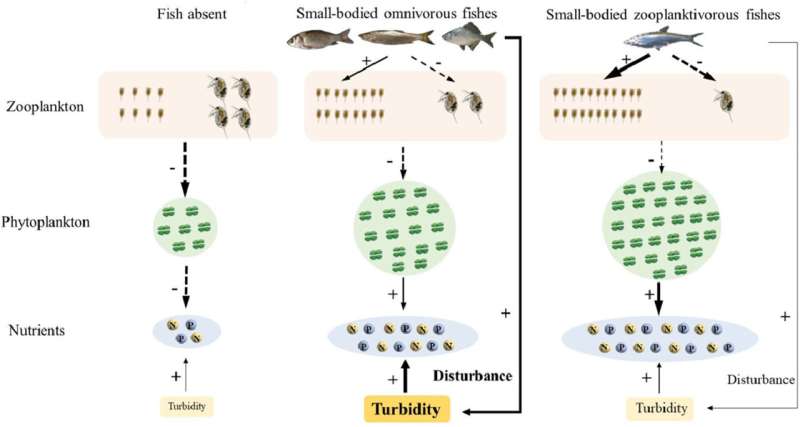This article has been reviewed according to Science X's editorial process and policies. Editors have highlighted the following attributes while ensuring the content's credibility:
fact-checked
trusted source
proofread
Researchers study feeding habits of small-bodied fishes

Small-bodied fishes play an important role in structuring aquatic ecosystems by transporting energy and nutrients from lower to higher trophic levels. However, the proliferation of small-bodied fishes in aquatic ecosystems can be accompanied by deterioration of water quality and ecosystem function.
Due to the overfishing of large-bodied commercial species and intensive removal of piscivorous fishes, small-bodied fishes now flourish in most of shallow lakes within the middle and lower reaches of the Yangtze River Basin (MLYRB). However, small-bodied fishes remain overlooked in the context of lake restoration within the MLYRB due to their small size, shorter life spans and low economic value.
Recently, a research group led by Prof. LIU Jiashou from the Institute of Hydrobiology (IHB) of the Chinese Academy of Sciences demonstrated the mechanisms of the impact of the dominant small fishes on plankton communities and water quality in shallow lakes within the MLYRB. This study was published in Water Research.
In this study, the researchers conducted a mesocosm experiment to quantify how plankton communities and water quality respond to different small-bodied fish species, i.e., crucian carp C. auratus (omnibenthivorous), sharpbelly H. leucisculus (omniplanktivorous), bitterling A. macropterus (omniplanktivorous) and thin sharpbelly T. swinhonis (zooplanktivorous).
They found that high abundances of small-bodied fishes can have adverse effects on water quality, and can lead to plankton communities being dominated by undesirable cyanophytes and small-bodied zooplankton.
By comparing the relative effects of a common zooplanktivorous fish with other omnivorous fishes, the researchers found that small-bodied zooplanktivorous fishes likely exert stronger top-down effects on zooplankton and water quality than those of small-bodied omnivorous fishes, but examining additional species of zooplanktivores would be beneficial for assessments of generalization.
These findings of this study revealed the mechanisms by which the dominant small fishes affect plankton communities and water quality in shallow lakes within the MLYRB, and provided new insights for informing the ecological restoration of shallow subtropical lakes, particularly those supporting an overabundance of small-bodied zooplanktivorous and omnivorous fishes.
More information: Chao Guo et al, The feeding habits of small-bodied fishes mediate the strength of top-down effects on plankton and water quality in shallow subtropical lakes, Water Research (2023). DOI: 10.1016/j.watres.2023.119705
Provided by Chinese Academy of Sciences




















